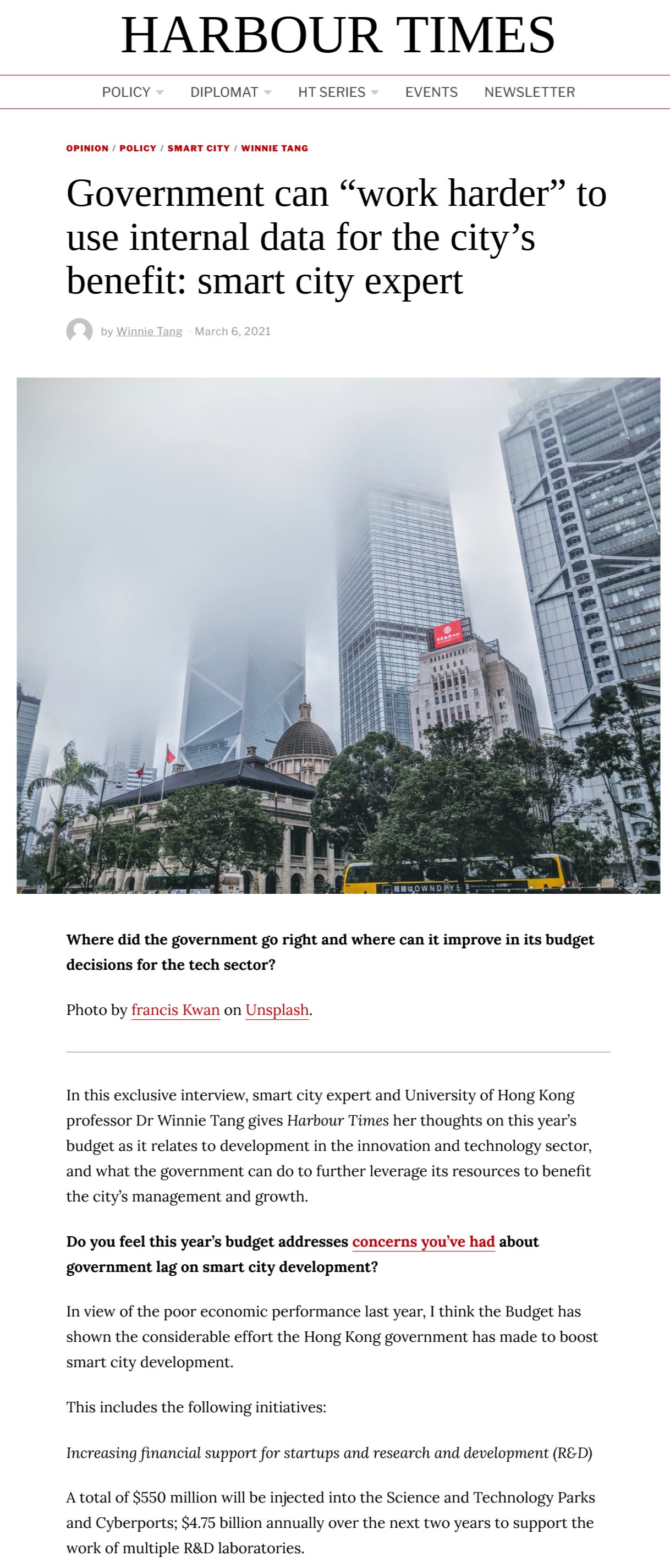網上版請按此

Government can "work harder" to use internal data for the city's benefit: smart city expert
In this exclusive interview, smart city expert and University of Hong Kong professor Dr Winnie Tang gives Harbour Times her thoughts on this year's budget as it relates to development in the innovation and technology sector, and what the government can do to further leverage its resources to benefit the city's management and growth.
Do you feel this year's budget addresses concerns you've had about government lag on smart city development?
In view of the poor economic performance last year, I think the Budget has shown the considerable effort the Hong Kong government has made to boost smart city development.
This includes the following initiatives:
Increasing financial support for startups and research and development (R&D)
A total of $550 million will be injected into the Science and Technology Parks and Cyberports; $4.75 billion annually over the next two years to support the work of multiple R&D laboratories.
Electronic government
All government forms and licence applications will be submitted electronically, and e payment will be available for paying most government bills and licences. The business version of the "iAM Smart" digital platform for authentication of the identity of enterprises is expected to be introduced later. These measures can facilitate individuals' lives and running businesses.
But the government can certainly work harder to make use of internal data to improve the near term level of governance.
The Budget has set aside $1 billion for maintenance works of "three-nil" buildings, which are buildings without owners' corporations, residents organisations, nor management companies that have aroused widespread concern over leaking sewer pipes during the COVID-19 pandemic. However, according to the government record, there are more than 9,000 "three-nil buildings" in Hong Kong, which makes it challenging to set the priority for maintenance. Further, if the funding is evenly allocated (less than $110,000 each) the amount for each building would not be able to sufficiently address its issues.
Therefore, I would suggest the government to link up its internal data to help understand the people-place relationship. For example, connecting the Building Department (building conditions, a record of drainage pipes within buildings), Drainage Services Department (public drains) and Census and Statistics Department (resident details of subdivided flats) together with the data collected by landlords. With this data compilation, they would be able to handle the drainage pipes issues more effectively.
Data showing people-place-linkage can also be useful for epidemic containment. If the information of the household, such as the number of residents, demographic characteristics (age, sex, nationality, language, and telephone numbers) is available before the ambush lockdown, the compulsory testing operation would be more efficient.
To facilitate the integration of data between departments, a shared digital platform, a Common Spatial Data Infrastructure (CSDI), is required. However, it will not be available until next year, and if accelerated, it can help to raise the level of governance.
Do you see the efforts to educate students on IT as a big step forward for HK?
Yes, I think the programs introduced in the Budget this year can upgrade the IT competency of HK's youth. Once the economy is back on track, we can seize this opportunity.
For example, the "Knowing More About IT" program is for primary schools to enhance students' interests and knowledge in I&T. To regularise a pilot scheme that subsidises local university students studying science and technology to enrol in short-term I&T related internships can also help nurture more IT savvy talents for our smart city.
What are your further recommendations for future IT budgeting?
As the government has committed to promoting innovation and technology for Hong Kong's long-term development, we can move one step forward through the following initiatives in future IT budgeting:
Fostering open data
Open data links people with places, which has the potential to spur new economies and entrepreneurship. In the UK, opening location data is believed to have pushed their digital economy to a level of £11 billion (about HK$117 billion) a year.
However, the progress of opening the government's data in Hong Kong is unsatisfactory as most valuable data remains locked in silos. Further, private sector participation is low. The Financial Secretary could allocate more funds to internal departments to encourage their integration of data in future Budgets.
At the same time, to harvest economic benefits, the government needs to promote the use of location data more to users and potential users. Therefore, it was suggested to add geospatial analysis at the secondary school level to improve students' understanding of geographic information, which would also help enhance their ability to solve problems and stimulate creativity.
KPI for IT budgeting
So far the government has spent over $100 billion in innovation and technology; it is essential to develop a key performance index (KPI) for the public to monitor the progress and to determine how we should proceed further. For example, what the return of investment is and will be, how many new jobs can be created, how Hong Kong's performance fares compared to other places, and more.
Dr. Winnie Tang
Adjunct Professor, Department of Computer Science, Faculty of Engineering; Department of Geography, Faculty of Social Sciences; and Faculty of Architecture, The University of Hong Kong.